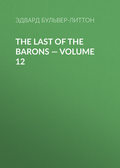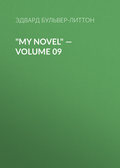
Эдвард Бульвер-Литтон
Falkland, Book 2
FROM ERASMUS FALKLAND, ESQ., TO THE HON. FREDERICK MONKTON
I will write to you at length to-morrow. Events have occurred to alter, perhaps, the whole complexion of the future. I am now going to Emily to propose to her to fly. We are not les gens du monde, who are ruined by the loss of public opinion. She has felt that I can be to her far more than the world; and as for me, what would I not forfeit for one touch of her hand?
EXTRACTS FROM THE JOURNAL OF LADY EMILY MANDEVILLE
Friday.—Since I wrote yesterday in these pages the narrative of our escape, I have done nothing but think over those moments, too dangerous because too dear; but at last I have steeled my heart—I have yielded to my own weakness too long—I shudder at the abyss from which I have escaped. I can yet fly. He will come here to-day—he shall receive my farewell.
Saturday morning, four o'clock.—I have sat in this room alone since eleven o'clock. I cannot give vent to my feelings; they seem as if crushed by some load from which it is impossible to rise. "He is gone, and for ever!" I sit repeating those words to myself, scarcely conscious of their meaning. Alas! when to-morrow comes, and the next day, and the next, and yet I see him not, I shall awaken, indeed, to all the agony of my loss! He came here—he saw me alone—he implored me to fly. I did not dare to meet his eyes; I hardened my heart against his voice. I knew the part I was to take—I have adopted it; but what struggles, what misery, has it not occasioned me! Who could have thought it had been so hard to be virtuous! His eloquence drove me from one defence to another, and then I had none but his mercy. I opened my heart—I showed him its weakness—I implored his forbearance. My tears, my anguish, convinced him of my sincerity. We have parted in bitterness, but, thank Heaven, not in guilt! He has entreated permission to write to me. How could I refuse him? Yet I may not—cannot-write to him again! How could, I indeed, suffer my heart to pour forth one of its feelings in reply? for would there be one word of regret, or one term of endearment, which my inmost soul would not echo?
Sunday.—Yes, that day—but I must not think of this; my very religion I dare not indulge. Oh God! how wretched I am! His visit was always the great aera in the clay; it employed all my hopes till he came, and all my memory when he was gone. I sit now and look at the place he used to fill, till I feel the tears rolling silently down my cheek: they come without an effort—they depart without relief.
Monday.—Henry asked me where Mr. Falkland was gone; I stooped down to hide my confusion. When shall I hear from him? To-morrow? Oh that it were come! I have placed the clock before me, and I actually count the minutes. He left a book here; it is a volume of "Melmoth." I have read over every word of it, and whenever I have come to a pencil-mark by him, I have paused to dream over that varying and eloquent countenance, the low soft tone of that tender voice, till the book has fallen from my hands, and I have started to find the utterness of my desolation!
FROM ERASMUS FALKLAND, ESQ., TO LADY EMILY MANDEVILLE
—– Hotel, London.
For the first time in my life I write to you! How my hand trembles—how my cheek flushes! a thousand, thousand thoughts rush upon me, and almost suffocate me with the variety and confusion of the emotions they awaken! I am agitated alike with the rapture of writing to you, and with the impossibility of expressing the feelings which I cannot distinctly unravel even to myself. You love me, Emily, and yet I have fled from you, and at your command; but the thought that, though absent, I am not forgotten, supports me through all.
It was with a feverish sense of weariness and pain that I found myself entering this vast reservoir of human vices. I became at once sensible of the sterility of that polluted soil so incapable of nurturing affection, and I clasped your image the closer to my heart. It is you, who, when I was most weary of existence, gifted me with a new life. You breathed into me a part of your own spirit; my soul feels that influence, and becomes more sacred. I have shut myself from the idlers who would molest me: I have built a temple in my heart: I have set within it a divinity; and the vanities of the world shall not profane the spot which has been consecrated to you. Our parting, Emily,—do you recall it? Your hand clasped in mine; your cheek resting, though but for an instant, on my bosom; and the tears which love called forth, but which virtue purified even at their source. Never were hearts so near, yet so divided; never was there an hour so tender, yet so unaccompanied with danger. Passion, grief, madness, all sank beneath your voice, and lay hushed like a deep sea within my soul! "Tu abbia veduto il leone ammansarsi alla sola tua voce."
'Ultime lettere di Jacopo Ortis.
I tore myself from you; I hurried through the wood; I stood by the lake, on whose banks I had so often wandered with you: I bared my breast to the winds; I bathed my temples with the waters. Fool that I was! the fever, the fever was within! But it is not thus, my adored and beautiful friend, that I should console and support you. Even as I write, passion melts into tenderness, and pours itself in softness over your remembrance. The virtue so gentle, yet so strong; the feelings so kind, yet so holy; the tears which wept over the decision your lips proclaimed—these are the recollections which come over me like dew. Let your own heart, my Emily, be your reward; and know that your lover only forgets that he adores, to remember that he respects you.
FROM THE SAME TO THE SAME
—– Park.
I could not bear the tumult and noise of London. I sighed for solitude, that I might muse over your remembrance undisturbed. I came here yesterday. It is the home of my childhood. I am surrounded on all sides by the scenes and images consecrated by the fresh recollections of my unsullied years. They are not changed. The seasons which come and depart renew in them the havoc which they make. If the December destroys, the April revives; but man has but one spring, and the desolation of the heart but one winter! In this very room have I sat and brooded over dreams and hopes which—but no matter—those dreams could never show me a vision to equal you, or those hopes hold out to me a blessing so precious as your love.
Do you remember, or rather can you ever forget, that moment in which the great depths of our souls were revealed? Ah! not in the scene in which such vows should have been whispered to your ear and your tenderness have blushed its reply. The passion concealed in darkness was revealed in danger; and the love, which in life was forbidden, was our comfort amidst the terrors of death! And that long and holy kiss, the first, the only moment in which our lips shared the union of our souls!—do not tell me that it is wrong to recall it!—do not tell me that I sin, when I own to you the hours I sit alone, and nurse the delirium of that voluptuous remembrance. The feelings you have excited may render me wretched, but not guilty; for the love of you can only hallow the heart—it is a fire which consecrates the altar on which it burns. I feel, even from the hour that I loved, that my soul has become more pure. I could not believe that I was capable of so unearthly an affection, or that the love of woman could possess that divinity of virtue which I worship in yours. The world is no fosterer of our young visions of purity and passion: embarked in its pursuits, and acquainted with its pleasures, while the latter sated me with what is evil, the former made me incredulous to what is pure. I considered your sex as a problem which my experience had already solved. Like the French philosophers, who lose truth by endeavouring to condense it, and who forfeit the moral from their regard to the maxim, I concentrated my knowledge of women into aphorism and antitheses; and I did not dream of the exceptions, if I did not find myself deceived in the general conclusion. I confess that I erred; I renounce from this moment the colder reflections of my manhood,—the fruits of a bitter experience,—the wisdom of an inquiring yet agitated life. I return with transport to my earliest visions of beauty and love; and I dedicate them upon the altar of my soul to you, who have embodied, and concentrated, and breathed them into life!






